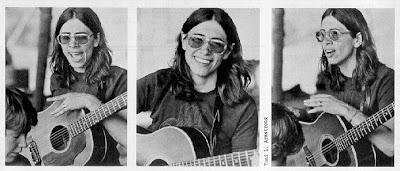 (Therese Edell, circa 1978, photo by Toni Armstrong Jr.)
(Therese Edell, circa 1978, photo by Toni Armstrong Jr.)
During the late 1970s and early 1980s, a lesbian-feminist singer/songwriter named Therese Edell toured women's communities and music festivals in the U.S. to admiring crowds. Often, she would stride on stage, her guitar slung over her back, and begin her set by holding up her hands in two O's, then bring her forefingers together in a point, while singing
Do you know what's round at both ends
High in the middle?
When I was a baby child
That was my favorite riddle
We dykes would cheer for Ohio, no matter where we had grown up. We knew Therese was from the Cincinnati feminist stronghold which had given us Crazy Ladies Bookstore, Dinah (originally Dinah Soar News), and which still contains the Ohio Lesbian Archives.
The fact is, much of what was best in the national lesbian/feminist culture of that era came from the Midwest. Also nationally known but originating from Ohio was Womenews, The American Negro Woman, and Working Women Newsletter (all from Cleveland); Women's Studies Review and lesbian mothers organizing in Columbus; plus the Feminist Health Fund Newsletter and waves of Socialist women's theory emerging from Yellow Springs. Michigan gave us the largest women's music festival (outside Hesperia), the annual MichFest; the sine qua non of lesbian news forums, Lesbian Connection (still publishing) from East Lansing; the influential Aradia Collective in Grand Rapids; Moving Out and Sojourner Third World Women's Research Newsletter from Detroit; Daily Dyke, Bridges Jewish Feminist Journal, Leaping Lesbian, Purple Star (from Radicalesbians), and several of the women who later formed The Furies from Ann Arbor. Other known hot spots for lesbian-feminist culture were Madison, Wisconsin (where Amazon, Wisconsin Tribal Women's News Najinakwe, Union Maid, and two women's science fiction journals, New Moon and Aurora, were published); Milwaukee, Wisconsin (home to the Bread and Roses Women's Health Center and Women of Color News); Lincoln, Nebraska (originator of Sinister Wisdom, still publishing); Lawrence, Kansas (publishing Monthly Cycle); Bloomington, Indiana; Minneapolis, Minnesota (home to Maize Lesbian Land Journal, Sing Heavenly Muse, So's Your Old Lady, Hurricane Alice, Women's Braille Press Newsletter, and the Lesbian Insider/Insighter/Inciter); Champaign-Urbana, Illinois (home of the other national women's music festival); Chicago, Illinois (giving us the Chicago Women's Liberation Union, Women and Children First Bookstore, Mountain Moving Coffeehouse, Jane [a safe underground abortion service before Roe v. Wade], and Voices of the Women's Liberation Movement, the first national women's liberation newsletter); and Iowa City, Iowa (home to Ain't I A Woman?, the Iowa City Women's Press, Aunt Lute Books, Better Homes and Dykes, and the standout Common Lives/Lesbian Lives).
This is all prologue to me saying I'm not at all surprised that Iowa this week legalized lesbian/gay marriage in a matter-of-fact way which will likely stand without reversal until 2012. Common sense and fair play are, in fact, Midwestern values. I don't view any part of this country as expendable, hopeless, or a "fly-over" zone. Like so many other non-conforming people, I fled my home (Texas) as a young adult, moving to San Francisco to be a dyke's dyke for a dozen years, because the urban cities of this continent's margins are where we cluster. But I returned because I love my people of origin and I knew exile is often self-imposed. I've not regretted my choice.
I suspect all those women who created culture in the 1970s and who stayed rooted in the Midwest probably played a large role in making this victory possible. Community is much larger than we progressives often paint it to be. (Don't mistake that for me agreeing with the fractured view of community put forth by conservatism.) In addition, from Suze Orman to Ellen Degeneres to Rachel Maddow, it seems like suddenly lesbians are not just trendy but being viewed as beacons to be followed by the larger world. Honestly, this makes me nervous, but we'll see how it all pans out.
Vermont's passage of same-sex marriage rights seems headed for a veto by their governor, which is like trying to hold back the Mississippi each year with sandbags instead of moving cities away from the floodplain. But I want to make it clear that I don't see marriage rights as the most important issue which should be embraced by lesbians and gays in this country, and I don't view the changes occurring in this arena to be about lesbian/gay rights per se.
If lesbians and gays marry at the same rate as heterosexuals, this issue will directly affect the lives of only about 25% of us. (And let's admit here, it's much more likely to be lesbians marrying than gay men, which is why so many of those "first to get married" photos are of two women.) And of that 25% who might want to marry, there's another solid percentage who don't actually believe in the institution of marriage. I know plenty of hets my age who feel the same way. (Cue Brooklyn Bridge singing "The Worst That Could Happen"...)
Of much deeper consequence, I believe, to the lives of most lesbian and gay people is job protection, freedom from housing discrimination (including for retirees), and safeguarding our youth from violence/misinformation at school. I find it significant that polls indicate much more support for equality and basic rights in these areas, especially the first two, than for "marriage rights". I think it's been a tactical error to focus on precisely where the Right is able to do its best fund-raising, whipping up a frenzy of fear and hate about how we threaten their world.
However, despite that error, change she is a'comin. It will be portrayed, right and left, as a growing recognition that we deserve to have our love sanctified in matrimony. I'm not sure that's true. I think the definition of marriage has been under enormous pressure to change since World War II, and this is only one manifestation of a culture-wide struggle to revise an institution whose role has been crucial to maintaining control by the elite few. Divorce, birth control, refusal to marry, open marriage, reversal of anti-miscegenation laws, and a broad array of women's rights issues are other indicators of this sea change. And the Right stands in opposition to them all, which tells me (should tell you as well) how important the myth of "traditional" marriage is to the patriarchy.
I think government should remove itself from the business of marriage except as a civil contract that people can undertake to derive certain legal benefits such as choosing a coparent to your children, ensuring inheritance and medical decision-making protection, and other financial agreements. Holy matrimony should be left to religious entities and not confused with the legal contract. I think we should push for civil unions only from the state, for everybody, and if you want a church wedding on top of that, fine by me but it should carry no legal standing -- only that certificate you both swear to in front of a clerk will be binding.
I can imagine this kind of practical approach emerging from the Midwest, spreading from town to town like a fervor for the community-building opportunities of boys' bands. But then, some of my best friends are from Iowa. And Nebraska. And Ohio.
[Cross-posted at Group News Blog.]
Monday, April 6, 2009
AS GOES IOWA...
Posted by
Maggie Jochild
at
6:53 AM
1 comments
![]()
Labels: lesbian-feminist culture, lesbian/gay human rights, marriage redefinition, Midwestern culture, same-sex marriage, Therese Edell
Thursday, September 4, 2008
MYRA'S FAVORITE SONGS

Myra plays music often in her study. I've taken the liberty of raiding the songs she plays more frequently and copying them into a Box.net file so you, too, can listen to what Ginny hears from around the wall. Click on this Myra's Faves link and choose your song to play.
The selections include (click on images to enlarge, though not all will enlarge much):
"Sweet Lullaby" by Deep Forest -- sung by an old Solomon Islands woman, the lyrics are part of an essential myth from their culture about the nature of death, sung by an older sister to her younger brother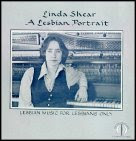 "Family of Woman" by Linda Shear, originally on her Lesbian Portrait album, but this version from High Risk, a benefit album of performance by Chicago women for the Lesbian Resource Cancer Center
"Family of Woman" by Linda Shear, originally on her Lesbian Portrait album, but this version from High Risk, a benefit album of performance by Chicago women for the Lesbian Resource Cancer Center "The Old Woman Song" written and performed by Michal Brody (this was released in the 1970's by Linda Shear on her Lesbian Portrait album, but this version was sung by Michal for High Risk, a benefit album of performance by Chicago women for the Lesbian Resource Cancer Center)
"The Old Woman Song" written and performed by Michal Brody (this was released in the 1970's by Linda Shear on her Lesbian Portrait album, but this version was sung by Michal for High Risk, a benefit album of performance by Chicago women for the Lesbian Resource Cancer Center)
"Summertime" by Janis Joplin (written by George Gershwin) "Hay Una Mujer Desaparecida" by Holly Near, with Adrienne Torf on piano and Enrique Cruz on zambona
"Hay Una Mujer Desaparecida" by Holly Near, with Adrienne Torf on piano and Enrique Cruz on zambona
"This Is To Mother You" by Emmy Lou Harris and Linda Ronstadt from the Western Wall/Tucson Sessions album (written by Sinead Oconnor)
"Western Wall" by Emmy Lou Harris and Linda Ronstadt from the Western Wall/Tucson Sessions album
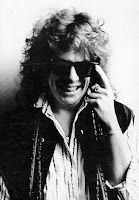
"Having Been Touched/Emma" performed by Holly Near; "Having Been Touched" was originally written and performed by Margie Adam, a women's music pioneer, and "Emma" was made famous by Therese Edell and Betsy Lippitt, but I don't have those versions available and this cover is excellent, with Adrienne Torf on piano and Nina Gerber on guitar
"Here Comes The Sun" by Nina Simone
"Get Right With God" by Lucinda Williams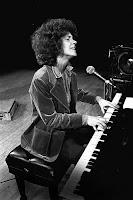
"Show Some Emotion" by Joan Armatrading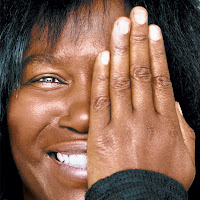 "I'm Lucky" by Joan Armatrading
"I'm Lucky" by Joan Armatrading "The Woman In Your Life is You" -- this was written by Alix Dobkin and used by Liza Cowan as a theme song on her WBAI radio show, but I don't have that version in MP3 format, so I'm using the Holly Near cover of it, with Nina Gerber on guitar
"The Woman In Your Life is You" -- this was written by Alix Dobkin and used by Liza Cowan as a theme song on her WBAI radio show, but I don't have that version in MP3 format, so I'm using the Holly Near cover of it, with Nina Gerber on guitar "Testimony" sung by Holly Near, although it was Ferron who made it famous, a women's music classic
"Testimony" sung by Holly Near, although it was Ferron who made it famous, a women's music classic
"Down to the River" by Allison Krauss (this brings up Myra's childhood religious memories in a good way; Ginny just rolls her eyes when this comes on) "Waterfall" written and originally performed by Cris Williamson on the biggest-selling women's music album of all time, The Changer and the Changed -- I don't have an MP3 of that, so I'm using the cover performed by Holly Near live at the 1985 Michigan Women's music Festival, with Rhiannon adding her vocals, Adrienne Torf on piano and Carrie Barton on bass
"Waterfall" written and originally performed by Cris Williamson on the biggest-selling women's music album of all time, The Changer and the Changed -- I don't have an MP3 of that, so I'm using the cover performed by Holly Near live at the 1985 Michigan Women's music Festival, with Rhiannon adding her vocals, Adrienne Torf on piano and Carrie Barton on bass
"Russian Song/Ode to Joy" by Pete Seeger (Myra is attached to the "Ode to Joy" version done by Pete)
"How Can I Keep From Singing" by Pete Seeger (this is often sung at Quaker Meeting) "Mountain Song/Kentucky Woman" by Holly Near -- the "mountain song" lyrics were a staple not just in women's music but as rhetoric in the movement itself; Meg Christian on guitars, Barbara Cobb on bass
"Mountain Song/Kentucky Woman" by Holly Near -- the "mountain song" lyrics were a staple not just in women's music but as rhetoric in the movement itself; Meg Christian on guitars, Barbara Cobb on bass
"Old Blue" performed here by Cisco Johnson, but Myra prefers to sing this very slowly and mournfully as that's how she heard it growing up "On Children" by Sweet Honey in the Rock
"On Children" by Sweet Honey in the Rock
"Little Potato" performed by Metamora, written by Malcolm Dalglish (Myra sung this to both her children when they were babies) "A Woman's Love" by Alix Dobkin (originally on Lavender Jane Loves Women -- written about and for our own Liza Cowan)
"A Woman's Love" by Alix Dobkin (originally on Lavender Jane Loves Women -- written about and for our own Liza Cowan)
"Gulf Coast Highway" written by Nanci Griffith, performed by her and Willie Nelson (this song reminds Myra so much of her parents' marriage, it always makes her cry)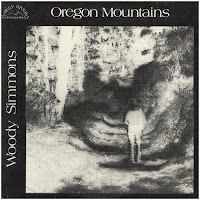 "Oregon Mountains" by Woody Simmons (huge women's music hit in the 1970s when dykes were forming land collectives all over Oregon)
"Oregon Mountains" by Woody Simmons (huge women's music hit in the 1970s when dykes were forming land collectives all over Oregon)
"Love Is All Around" by Joan Jett and the Blackhearts (otherwise known as the Mary Tyler Moore Show theme song) "The Road I Took To You" written and sung by Barbara Keith, but it was the Meg Christian version on one of the first women's music albums ever which Myra and Ginny sang to one another in the Arboretum which helped launch and define their relationship
"The Road I Took To You" written and sung by Barbara Keith, but it was the Meg Christian version on one of the first women's music albums ever which Myra and Ginny sang to one another in the Arboretum which helped launch and define their relationship
Posted by
Maggie Jochild
at
11:29 AM
0
comments
![]()
Labels: Alix Dobkin, Betsy Lippitt, Cris Williamson, Ferron, Ginny Bates: Myra's Favorite Songs, Holly Near, Liza Cowan, Margie Adam, Michal Brody, Therese Edell




